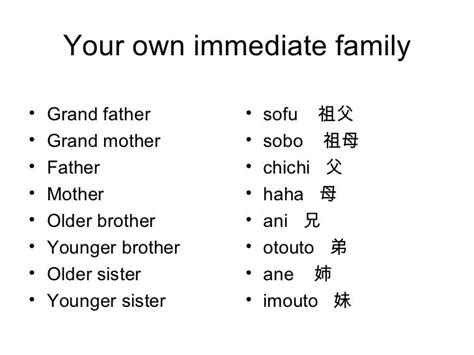In many Asian cultures, including Japan, the relationship between siblings is deeply valued and respected. The way you address your older sister in Japanese can vary depending on the level of formality, the context, and your personal relationship with her. Here are five ways to say "older sister" in Japanese, each with its own nuances and uses.
1. Onee-san (お姉さん)

Onee-san is a polite and respectful term used to address an older sister or an older girl. It's a combination of "onee," meaning "older sister," and the honorific suffix "-san." This term is commonly used in formal situations or when speaking to someone you don't know well.
Example:
- "Onee-san, gakko ni ikimasu ka?" (Is your sister going to school?)
2. Ane (姉)

Ane is a more casual and informal term used to address an older sister. It's a direct translation of "older sister" and is commonly used among family members or close friends.
Example:
- "Ane, gomen ne!" (Sorry, sis!)
3. Onee-chan (お姉ちゃん)

Onee-chan is a cute and affectionate term used to address an older sister. The suffix "-chan" is a diminutive form that adds a playful and endearing tone to the word.
Example:
- "Onee-chan, watashi no omocha o miseru!" (Big sis, can I play with your toys?)
4. Ane-ue (姉上)

Ane-ue is a more formal and respectful term used to address an older sister. The suffix "-ue" is an honorific form that adds a sense of respect and reverence to the word.
Example:
- "Ane-ue, o-genki desu ka?" (How are you, older sister?)
5. Nee-san (姉さん)

Nee-san is another polite and respectful term used to address an older sister. It's a combination of "nee," meaning "older sister," and the honorific suffix "-san."
Example:
- "Nee-san, dozo!" (Here you go, older sister!)
In conclusion, there are many ways to say "older sister" in Japanese, each with its own level of formality and nuance. Whether you're speaking to a family member or a friend, using the right term can show respect, affection, and thoughtfulness.
Gallery of Japanese Sister Terms:






What is the most common way to say "older sister" in Japanese?
+Onee-san (お姉さん) is a commonly used term to address an older sister in Japanese.
What is the difference between "onee-san" and "ane"?
+"Onee-san" is a more polite and formal term, while "ane" is a more casual and informal term.
How do you address an older sister in a formal situation?
+In a formal situation, you can use the term "ane-ue" (姉上) to address an older sister.
